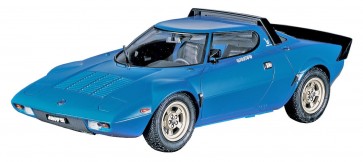-20%
Hasegawa 1/24 Lancia Stratos HF "Stradale" japan NEW
Availability: No Stock
Regular Price: €20.23
Special Price €16.18
Details
Details
Plastic / car model assembly kit 129 parts. November 1970 Bertone announced the original Stratos at the Torino show, Stratos of Marcello Gandini design was greeted with a great shock.
In November 1971 the second prototype car was presented to Lancia, the car was replaced by a completely new design that introduced a midship layout and the objective of development was to win the title of WRC.
The next year prototype, participating in various rallies, preparations for mass production were advanced, and the production of Stratos was started in October 1973. The mass production car body is made of steel monocoque in the center, front and rear cowls made of FRP, maintenance is high as the cowl opens as it is. Engine equipped with V65 degree 6 cylinder DOHC developed for Ferrari's Dino 246 GT, Stratos changed the setup with importance on low-speed torque in the engine developed for road racing, with the maximum output 190 ps / 7,000 rpm power and Generate torque of 23.0 kg / 4,000 rpm. The suspension is equipped with a double wishbone on the front, McPherson strut coil on the rear, even designed for a wide range of adjustment even commercially available cars. As the interior of Stratos was developed as a rally car, there is only a minimum of equipment and the interior is not wide as well as outside dimensions, but the opinion of Sandro Munari is added as much as the workers driver with a height of 180 cm.
500 mass production vehicles were produced, and group 4 homologation was acquired in October 1974, after which Stratos' popularity was high and further 500 were additionally produced.
Stratos made his debut in 1974 WRC Round 5 San Remo Rally and won the Make title for this season. In 1975, when it became a full-scale participation in 1975, Stratos, which was developed as the world's first Purpose Bild Machine, achieves the achievement of winning the 3rd consecutive Make-of-the-Case title without declining in strength in 1976, represents the 1970s It is still a popular supercar as a rally car.
"data"
Total length: 3, 710 mm
Full width: 1,750 mm
Wheelbase: 2,180 mm
Tread (F / R): 1,430 / 1,460 mm
Engine type: water cooled 65 degrees V type 6 cylinder DOHC
Bore × Stroke: φ92.5 × 60.0 mm
Total displacement: 2,418 cc
Compression ratio: 9.0: 1
Maximum power: 190 ps / 7,000 rpm
Maximum speed: 230 km / h
Vehicle Weight: 980 kg
In November 1971 the second prototype car was presented to Lancia, the car was replaced by a completely new design that introduced a midship layout and the objective of development was to win the title of WRC.
The next year prototype, participating in various rallies, preparations for mass production were advanced, and the production of Stratos was started in October 1973. The mass production car body is made of steel monocoque in the center, front and rear cowls made of FRP, maintenance is high as the cowl opens as it is. Engine equipped with V65 degree 6 cylinder DOHC developed for Ferrari's Dino 246 GT, Stratos changed the setup with importance on low-speed torque in the engine developed for road racing, with the maximum output 190 ps / 7,000 rpm power and Generate torque of 23.0 kg / 4,000 rpm. The suspension is equipped with a double wishbone on the front, McPherson strut coil on the rear, even designed for a wide range of adjustment even commercially available cars. As the interior of Stratos was developed as a rally car, there is only a minimum of equipment and the interior is not wide as well as outside dimensions, but the opinion of Sandro Munari is added as much as the workers driver with a height of 180 cm.
500 mass production vehicles were produced, and group 4 homologation was acquired in October 1974, after which Stratos' popularity was high and further 500 were additionally produced.
Stratos made his debut in 1974 WRC Round 5 San Remo Rally and won the Make title for this season. In 1975, when it became a full-scale participation in 1975, Stratos, which was developed as the world's first Purpose Bild Machine, achieves the achievement of winning the 3rd consecutive Make-of-the-Case title without declining in strength in 1976, represents the 1970s It is still a popular supercar as a rally car.
"data"
Total length: 3, 710 mm
Full width: 1,750 mm
Wheelbase: 2,180 mm
Tread (F / R): 1,430 / 1,460 mm
Engine type: water cooled 65 degrees V type 6 cylinder DOHC
Bore × Stroke: φ92.5 × 60.0 mm
Total displacement: 2,418 cc
Compression ratio: 9.0: 1
Maximum power: 190 ps / 7,000 rpm
Maximum speed: 230 km / h
Vehicle Weight: 980 kg
Additional Info
Additional Info
| Manufacturer | HASEGAWA |
|---|---|
| Weight (kg) | 0.4600 |
| Release Date | No |
| Series | No |
| Package Depth (mm) | 350 |
| Package Height (mm) | 20 |
| Package Width (mm) | 50 |
Reviews
Tags





